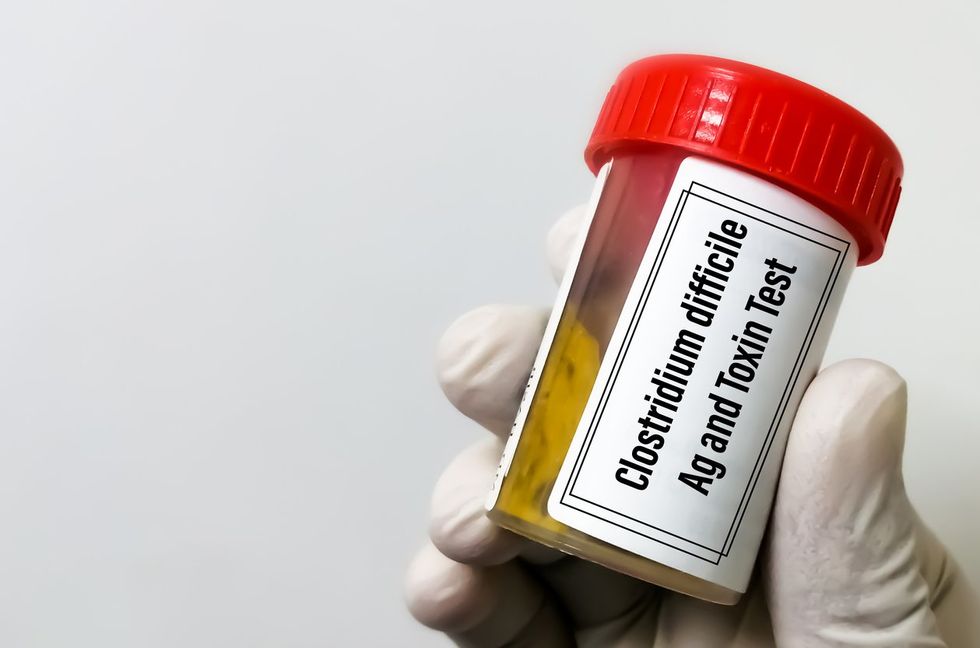

If you haven’t heard of C. difference before, is the common name for a bacterial infection in the colon caused by the bacteria Clostridioides difficile. C. difference Bacterial spores are found everywhere in the environment, including healthcare environments, non-sanitary environments, and even on surfaces. shoe soles. Unfortunately, that means it can easily be transferred to the colon through the mouth. If you touch an object that has C. difference on it and put your hand to your mouth, you can introduce the bacteria into your gastrointestinal (GI) system. You can also catch the bacteria from someone who has it on their skin. However, even if you ingest C. difference spores, you only get an infection if they can grow in the colon.
C. difference It is an aggressive bacteria that causes serious problems among almost a half a million people in the United States every year. And till 30,000 people die from a C. difference infection annually. Women are more likely than men get a C. difference infection, but the reason is still unknown.
How does C. diff cause infection?
Everyone has bacteria in their colon. Many are good bacteria and help keep the colon healthy by helping with digestion, producing various vitamins, and preventing harmful bacteria from taking over. Even dangerous bacteria, such as C. difference, it may not make you sick if you have a healthy gut microbiome. A lot of people have C. difference in your colon and never get sick.
C.diff Bacteria enter the body after swallowing. C. difference spores. If you are sick or have a weakened immune system, C. difference It could be dangerous. Most people get C. difference infection after taking antibiotics, which, while usually necessary, can also kill the beneficial bacteria along with the harmful bugs that caused the infection. He C. difference The bacteria grow and multiply, releasing toxins that damage the lining of the colon and cause symptoms that make you feel sick.
What are the risk factors for C. diff?
C. difference It can affect anyone. However, you are more likely to have a C. difference infection if you:
- You are taking antibiotics for a different infection, because antibiotics also destroy healthy bacteria that would normally prevent an infection. C. difference infection. The longer the antibiotic treatment, the greater the risk.
- Have you recently been in a nursing home or hospital? About 2 out of 10 people in medical facilities hire a C. difference infection.
- You have a weakened immune system due to an illness or a medication such as a corticosteroid, because it can suppress your ability to fight infections.
- You have an intestinal disease, such as Crohn’s disease or ulcerative colitisbecause they weaken the lining of the colon over time.
- You are taking proton pump inhibitors (often called PPIs) or other acid-suppressing medications unnecessarily.
- Have a history of C. difference infections. Until 1 in 4 people who has C. difference You will have a relapse or get the infection again at least one more time.
- You are 65 years old or older.
Remember: You do not need to have any of the risk factors above to get C. difference. Anyone is at risk.
C. different symptoms
First of all,C. difference symptoms It may look like another type of gastrointestinal illness, such as a virus or food poisoning. Symptoms may be mild at first, such as a few bouts of diarrhea or watery stools. However, something that could stand out is a very particular strong smell, different from what you normally notice. These episodes become more frequent as the infection worsens. Apart from diarrhea, C. difference Symptoms may include:
- Stomach pain and cramps
- Nausea and vomiting
- Loss of appetite
- Abdominal swelling
- Fever
- Fast heart rate
- Blood in the stool
You may also become dehydrated due to infection due to frequent diarrhea.
C. differential diagnosis
If you experience any of the symptoms and are at risk, your doctor may order a stool sample to be tested in a laboratory.
If your symptoms are severe or you do not respond to treatment, your doctor may order blood tests and imaging tests, such as x-rays, magnetic resonance imaging (MRI), or a colonoscopy to see if there is damage to your colon. .
C. different treatment
If you hire a C. difference infection while taking antibiotics for another infection and the illness is mild, your healthcare provider may recommend that you simply stop the medication. If that doesn’t help, antibiotics can treat C. difference infection are:
- vancomycin
- Fidaxomicin
- Metronidazole (for mild infections only)
If you take these medications at home, it is important that you finish the entire prescription, or the bacteria may grow again and the infection may return. It may also become more difficult to treat. If the infection is severe and you are dehydrated, you may need to be admitted to the hospital so you can receive antibiotics and intravenous (IV) fluids.
Oral and rectal microbiome-based treatments have recently been approved by the FDA and offer a new option to help prevent recurrence. C. difference infections.
How do you know if C. diff is getting better?
You should start to see improvements in your symptoms. within three to five days starting antibiotics (but you should always finish your entire prescription). However, some people need more antibiotics to clear the infection completely. Up to 1 in 4 people who have C. difference For the first time, you will get it again, so contact your doctor right away if your symptoms return. Also tell your dentist and other healthcare professionals that you have had C. difference to avoid taking antibiotics you don’t need.
May reduce the risk of getting or spreading C. difference with a few simple steps:
- Make sure all healthcare workers wash their hands before touching you, especially in a hospital.
- Wash your hands thoroughly with soap and water every time you use the bathroom and before and after eating or drinking. Be sure to use soap and water because C. difference The spores are resistant to ethanol, also called ethyl alcohol, which is found in most hand sanitizers.
- if you have C. difference and you have access to a second bathroom, use only that one so that the others are not exposed. If this is not possible, thoroughly clean the toilet seat, toilet handle, faucets, and doorknob with a bleach-based cleaner every time you use the bathroom.
- Clean common household surfaces (doorknobs, light switches, etc.) with a bleach-based cleaner.
- Shower with soap to remove C. difference of your skin.
This resource was created with the support of Seres Therapeutics and Nestlé Health Sciences.
From the articles on your site
Related articles on the Web







